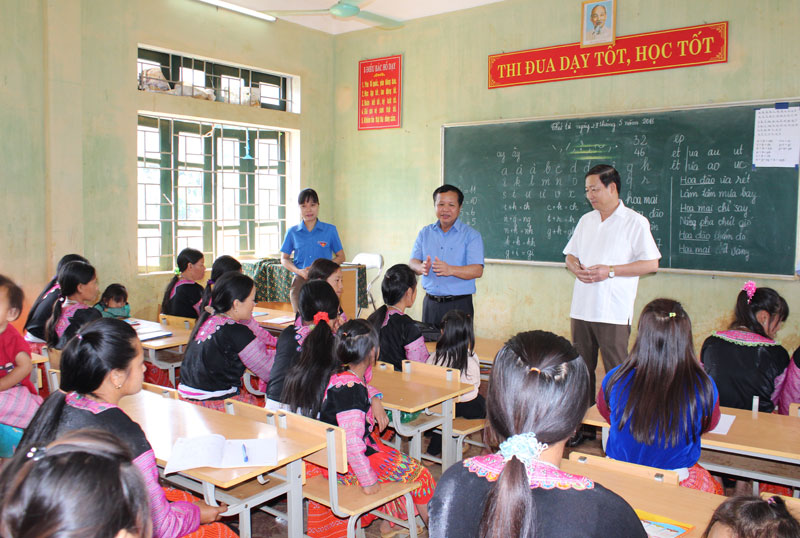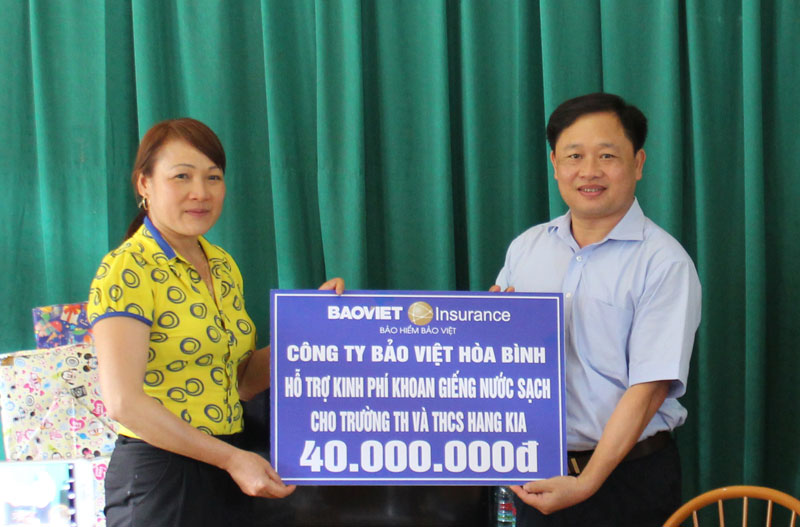
(HBO) – Vice Chairman of the provincial People’s Committee Bui Van Cuu examined the education universalisation and illiteracy reduction work in Hang Kia commune, Mai Chau district. Leaders of the provincial Department of Education and Training, provincial Military High Command, and Mai Chau district also joined the inspection.
Hang Kia commune is home to 631 households with 3,389 residents, of whom Mong
ethnic people account for over 99.9 percent. Currently, the commune meets
the standard of pre-school education universalisation for children of five
years old, third level standard of primary education universalisation and first
level standard of secondary education universalisation.
At the working session, Hang Kia commune presented some challenges in education
universalisation, including large geographical area, unequal distribution of population,
and shortage of classrooms, among others.
Cuu noted that the locality needs to enhance communication work and encourage
the illiteracy elimination. It should work to mobilise students to attend
school, he said.

Vice Chairman of the provincial People’s Committee Bui Van Cuu inspects a class
for illiterates in Hang Kia commune.

Bao Viet Hoa Binh Insurance Company supports 40 million VND for Hang Kia B
primary and secondary school to drill a well for clean water.
He recommended the locality organise summer activities for students and build a
clean and green pedagogical environment.
On the occasion, Duc Nhanh Construction Co., Ltd, Bao Viet Insurance company,
the Department of Education and Training, and provincial Military High Command
provided financial support for the commune to drill wells, organise classes for
illiterates and buy computers./.
Hoa Binh province is undergoing a dynamic transformation amid Vietnam’s national digital transition. Building on Poliburo’s Resolution No. 57-NQ/TW on breakthroughs in science, technology, innovation, and national digital transformation, the province has rolled out a wide range of practical action plans. A standout initiative is the "Digital Literacy for All” movement, an effort to ensure that no one is left behind in the digital era.
Hoa Binh province is undergoing a dynamic transformation in the wake of the national digital transformation movement. Building on Resolution No. 57-NQ/TW of the Politburo on breakthroughs in science, technology, innovation, and national digital transformation, the province has implemented a wide range of practical action plans. A standout initiative is the "Digital Literacy for All” movement ambitious effort to ensure that no one is left behind in the digital age.
With a spirit of unity and proactive problem-solving, the Party Committee, the government and the people of Dong Lai Commune (Tan Lac District) have made great strides in implementing the resolutions of the 24th Party Congress of the commune for the 2020 - 2025 term. Focusing on leadership and practical actions, the commune has brought the Party’s resolutions into daily life, creating strong impacts and pushing the local development forward.
Amid the nationwide push for digital transformation, young people in Hoa Binh Province are stepping up as dynamic pioneers, applying technology to enhance Youth Union operations and expand the reach of youth-led initiatives. Through creativity and adaptability, Youth Union organizations at all levels have introduced a series of practical solutions, contributing to modern governance and community development.
In recent years, An Nghia commune, located in Lac Son district, has stepped up administrative reform, focusing on improving the quality and efficiency of its single-window service unit for receiving and processing administrative procedures. These improvements have helped create favourable conditions for local residents and organisations to handle administrative procedures, contributing to the commune’s broader socio-economic development.
The Prime Minister-approved master plan to develop the multi-use value of forests ecosystems through 2030, with a vision to 2050, aims to improve the management and sustainable use of forest resources, create jobs, increase incomes, and improve the living standards of ethnic minorities, people in mountainous and remote areas, forest workers and those living near forests.




